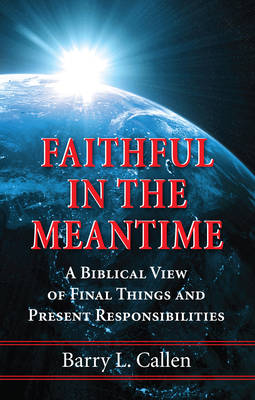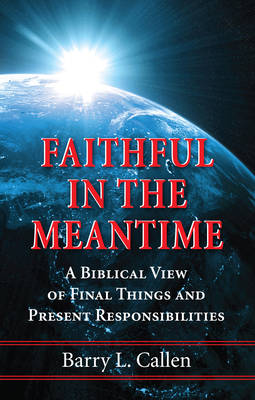
- Retrait gratuit dans votre magasin Club
- 7.000.000 titres dans notre catalogue
- Payer en toute sécurité
- Toujours un magasin près de chez vous
- Retrait gratuit dans votre magasin Club
- 7.000.0000 titres dans notre catalogue
- Payer en toute sécurité
- Toujours un magasin près de chez vous
Description
Barry Callen is a ""church theologian"" in the finest sense. In this book he once again brings the commitments nurtured by Pietist, Anabaptist, and Wesleyan theological streams into conversation with the issues and debates in contemporary church life and with the most formative voices in contemporary theology. The result is a convincing reminder that Christian teachings about ""ultimate things"" (eschatology) are much more concerned with providing hope and direction for living faithfully in our present settings than they are with providing timetables for the future. His exposition of the role of the church and sacrament in nurturing such hope is particularly helpful. Randy L. Maddox, Professor of Wesleyan and Methodist Studies, Duke University Divinity School In a day when fanciful end-times speculations abound, the church does well to give heed to voices that call us back to the fundamentals of biblical eschatology. Barry Callen is such a voice. As he so forcefully declares, rather than focusing on dates and times, God calls us to be ""faithful in the meantime."" Stanley J. Grenz, Professor Emeritus of Theology, Ethics, Baptist Heritage, Carey Theological College and Regent College The doctrine of last things is important because faith would be empty if it could not hope for the coming of the kingdom of God. What we have in eschatology are not so much secrets about the future as images of God's final purposes which are meant to impact our every action and judgment. Here we have, thanks to Barry Callen, a responsible, informed, interesting, and up-to-date account of our blessed hope. Clark H. Pinnock, Professor Emeritus of Theology, McMaster Divinity College Barry L. Callen is University Professor and Vice President of Academic Affairs Emeritus, Anderson University, Editor of Aldersgate Press, author of Radical Christianity (1999), Approaching Theology (2015), Heart of the Matter (2016), and Bible Stories for Strong Stomachs (2017).
Spécifications
Parties prenantes
- Auteur(s) :
- Editeur:
Contenu
- Nombre de pages :
- 286
- Langue:
- Anglais
Caractéristiques
- EAN:
- 9781498244305
- Date de parution :
- 27-06-17
- Format:
- Livre relié
- Format numérique:
- Genaaid
- Dimensions :
- 140 mm x 216 mm
- Poids :
- 480 g

Les avis
Nous publions uniquement les avis qui respectent les conditions requises. Consultez nos conditions pour les avis.






